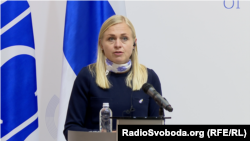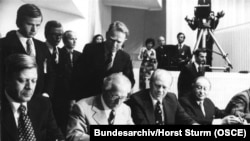On July 31 and August 1, hundreds of officials and politicians will gather in Finland to celebrate the 50th anniversary of the Helsinki Final Act.
That agreement was something of a high-water mark of the Cold War detente, with 35 countries -- including the Soviet Union and United States -- agreeing on numerous principles after two years of talks known as the Conference on Security and Cooperation in Europe (CSCE).
This would shape the geopolitical architecture of the wider European continent and laid the foundation for what became the Organization for Security and Cooperation in Europe (OSCE) after the fall of the USSR.
At first glance, there should be a lot to celebrate.
And Finland, which fittingly took over as OSCE chair at the start of the year, is playing it big.
On July 31, both Ukrainian President Volodymyr Zelenskyy and UN Secretary-General Antonio Guterres will give keynote speeches in Helsinki followed by high-level panels of all sorts, debating the future of the OSCE under the theme: Respect, Respond, Prepare.
The Finnish chairmanship will also use the opportunity to launch the “Helsinki+50 Fund,” an initiative aimed at boosting voluntary funding for the Vienna-based organization.
Yet many are asking whether the OSCE still serves its original purpose.
A Grand Bargain
Back in 1975, it did represent something of a grand bargain between the democratic West and the communist East.
The Helsinki Final Act was celebrated in Moscow as it affirmed the status and inviolability of the existing borders in Europe at the time. It meant continued Soviet dominance of the Warsaw Pact countries and de facto, if not de jure, recognition of the annexation of the Baltic states.
But it also created three so-called “baskets” of future East-West cooperation: political and military affairs; economic and scientific cooperation; and, perhaps most significantly, human rights.
While the Soviet Union thought it had “won” at first, it was in fact the West that came out better in the long run, not least due to that third basket, which prompted an international human rights movement across the Cold War divide.
It inspired the Solidarity movement in Poland, the Baltic Way in Estonia, Latvia, and Lithuania, and Charter 77 in Czechoslovakia -- movements that helped pave the way for the fall of the Iron Curtain and the dissolution of the Soviet Union.
With the creation of the OSCE in the 1990s, that third human rights basket was expanded to include things such as the protection of national minorities, press freedom, and the Office for Democratic Institutions and Human Rights (ODIHR), which to this day sets standards for election observation missions.
In a letter to the 57 OSCE member states seen by RFE/RL, Finnish OSCE Ambassador Vesa Hakkinen invited them to the Helsinki celebration and wrote: “The Helsinki Final Act took a novel approach to managing tension and preventing conflict by setting out a comprehensive set of agreed principles and commitments to guide not only relations between States but within them. Fifty years later, the OSCE's principles and commitments remain a vital part of the European security order.”
Whether that remains true is increasingly debated.
A Builder of Bridges?
The need for consensus in the organization has highlighted its shortcomings, especially as a seemingly revanchist and resurgent Russia has tested the entire post-Cold War structure for several years.
The OSCE mission in Georgia was not prolonged in 2009, a year after Russia’s invasion of the South Caucasus republic. Moscow’s subsequent recognition of the Georgian breakaway regions of Abkhazia and South Ossetia further undermined the organization.
When Russia forcibly annexed Crimea in 2014 and occupied parts of eastern Ukraine later that year, Moscow first permitted a limited OSCE monitoring mission, but this was then terminated completely not long after the full-scale invasion in early 2022.
Three former monitoring mission staff members have remained in illegal Russian captivity since then, with the OSCE making scant progress in getting them released.
This has also prompted other nations to dismiss some of the organization’s established mechanisms.
The OSCE Minsk Group, created to find a peaceful resolution between Armenia and Azerbaijan over Nagorno-Karabakh, was rendered useless after Baku seized the entire territory in 2023 and Azerbaijani President Ilham Aliyev openly called for the group to be disbanded. As a result, the OSCE budget remains stalled, with Azerbaijan withholding approval until all Minsk-related institutions are removed.
Despite this, there is no real discussion in Vienna about suspending Russia (or any other country for that matter). Instead, several OSCE officials told RFE/RL that dialogue and “open channels of communication” between all participating states remain essential.
In preparing for the Helsinki meeting, the Finnish delegation to the OSCE sent out an invitation to all countries to engage in “small group discussions” throughout the spring to tackle questions such as how to hold each other accountable, whether there is a minimum level of trust needed in order for the OSCE to function, and whether it can be a “bridge builder.”
In June, a new Finnish letter, seen by RFE/RL, was sent out summarizing the discussion, and it is evident that there might not be much change, if any, going forward.
'Frustration With The Consensus Rule'
One of the conclusions was that “while desirable, trust is not a requirement for dialogue.” Another, seemingly contradictory, finding was that “participants confirmed the continued validity and importance of the OSCE principles and commitments, even -- and especially -- as they are being violated, most severely by Russia's war of aggression against Ukraine.”
On accountability, there was even an admission that the OSCE “cannot enforce compliance with its principles.”
The letter also notes that many “expressed frustration with the consensus rule” but also added that “many clearly feel strongly that consensus is the essence of the OSCE and an important guarantor for inclusive decision-making.” The letter notes “frustration with the consensus rule” but adds that many see consensus as “the essence of the OSCE and an important guarantor for inclusive decision-making.”
Not surprisingly, the document concludes that “this is not the time for major reforms. Nevertheless, most participants called for small, incremental adjustments to enable the OSCE to better perform its core functions.”
The future of the OSCE might instead rest on a “coalition of the willing” formed to circumvent vetoes -- as seen across many other international institutions in recent years.
One such move was the OSCE Secretariat's Support Program for Ukraine (SPU) -- a portfolio of extra-budgetary projects. The idea appeared at the end of June 2022 when Russia blocked consensus on the extension of the OSCE Project Coordinator in Ukraine --- a full-fledged OSCE field operation that had been active since 1999.
Then there is the increased use of the OSCE Moscow mechanism, which has been triggered five times since Russia’s full-scale invasion of Ukraine three years ago, most recently to document alleged Russian crimes against prisoners of war and civilian detainees.
With no consensus needed to be activated, the mechanism’s fact-finding missions by experts and subsequent reporting will prove useful in various courts, notably the recently established special tribunal for the crime of aggression against Ukraine.
Whether these workarounds can keep the OSCE relevant will be debated long after the Helsinki anniversary events conclude.











